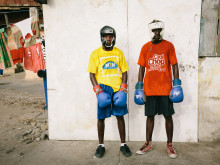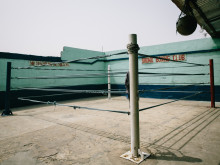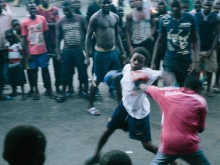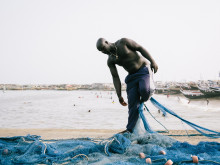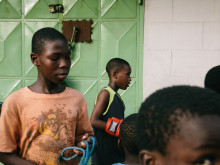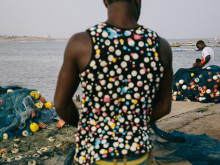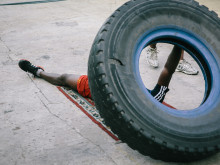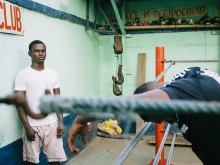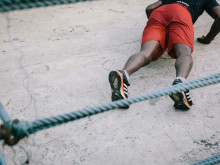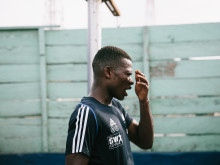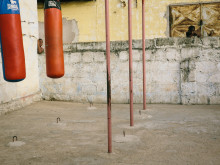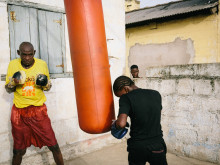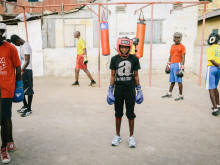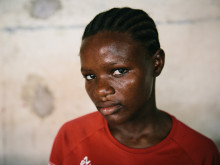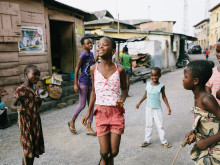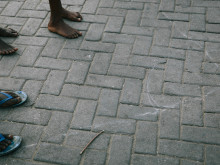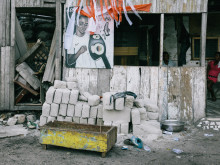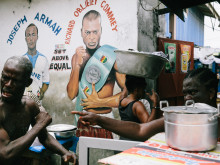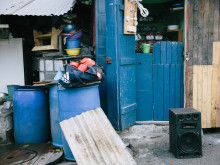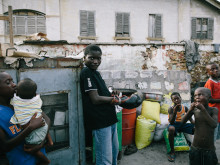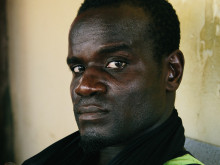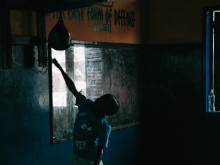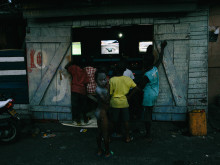The Boxing champions from Bukom
On Sunday afternoon a growing group of people gather together at the market in Bukom. From different alleyways people find their way to the square. There is a sign and a young man steps forward. The referee raises his arm. The crowd cries out. More people join. The children that stand front row are roughly pushed aside with a wooden stick. Another person is brought into the ring. A signal to start is given and the fighting begins. The one wearing the white T-shirt, you can hardly tell, is actually a girl. Her contender is a boy her age. Both are wearing flip-flops and four different boxing gloves. She is petite but agile and positions her punches strategically. The crowd is euphoric. Her next contender goes down, just like number three. After that, nobody dares to step forward anymore. The fight is over – the cedis are paid out. No match without bets. The girl is called Leticia Ankrah and is only sixteen years old. Her trainer Theophilus saw her fight during a talent scout and thought: ‘this one I need to have’. Theophilus: “I saw a champion.”
Bukom is an old fishing neighbourhood in the heart of Accra. Its part of Jamestown, the part of town from where Accra originated and which used to serve as the capital of British Ghana. There are still quite a few buildings, or that what’s left of them, that remind you of the colonial past.
The streets of Bukom are full of people selling foods or drinks or just hanging about. There is music and much ordinary noise: motorcycles passing by, heated conversations, the noise of clattering pans. The odours of cooking mix with the salty smell of fish, the exhaust fumes and the heat. People’s homes, little more than sheds made of corrugated sheets, don’t attain to a lot. Life here takes place on the street.
Bukom is poor. Except for the fishing business there is hardly any other industry. For young people there is little perspective. They play football or they box, or they do both. And the latter, they do exceptionally well. Azumah “The Professor” Nelson, David “D. K. Poison” Kotei, Ike “Bazooka” Quartey, Alfred “Cobra” Kotey and Joshua “The Hitter” Clottey: all boxers from Bukom that won a world title. But don’t forget Joseph “King Kong” Agbeko, Emmanuel Clottey, Ike Quartey Sr. Braimah “Bukom Banku”, Kwame Asante or Floyd Roberston. Boxers that may not have become world champion but who did win Olympic gold or became number two on the world ranking. Bukom as a breeding ground for boxing world champions, how is that possible?
Joshua Clottey, a former IBF [International Boxing Federation] welterweight world champion, explains it as follows: “Bukom is small but tough. There is always fighting going on here. So if you’re here, you’ll be strong because you will fight. You will always fight. And people fight serious, this is not for fun.”
Successful boxers are still very much looked up to in Bukom. Their image is found everywhere around the streets. And even if most champions move to wealthier parts of Accra when the success starts coming in, you still bump into them at anytime in Bukom. This is the place where they train. This is where every amateur with professional aspirations comes to train. Bukom, with its amazing list of world champions, has mythical status.
And it’s easy to understand why. Because what makes a successful boxer? Bukom delivers all ingredients. Research into the psychology of boxing shows that certain characteristics are essential for success: self-confidence, emotional control and mental toughness in delivering and receiving punches. Children in Bukom grow up with these characteristics. You see them fight on the street as soon as they can walk. “Everyone who comes from here knows how to fight. It’s in out blood. If it’s about fighting, we know no fear. That’s a certainty you have if you grow up here”, tells Richard Commey, a young boxing talent well on his way to become the next world champion coming from Bukom [and current holder of the IBF Africa Lightweight title]. “Bukom makes you tough”, adds Joshua Clottey. “You don’t have to be afraid to fight. It’s normal.” “I’m never scared,” says Leticia Ankrah as well, “I feel no pain.”
